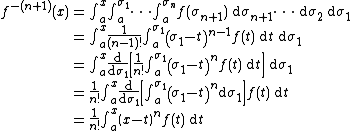- Scalar case
- Applications
- References
- External links
The Cauchy formula for repeated integration, named after Augustin Louis Cauchy, allows one to compress n antidifferentiations of a function into a single integral (cf. Cauchy's formula).
Scalar case
Let ƒ be a continuous function on the real line. Then the nth repeated integral of ƒ based at a,
,
is given by single integration
.
A proof is given by induction. Since ƒ is continuous, the base case follows from the Fundamental theorem of calculus:
;
where
.
Now, suppose this is true for n, and let us prove it for n+1. Firstly, using the Leibniz integral rule, note that
.
Then, applying the induction hypothesis,
This completes the proof.
Applications
In fractional calculus, this formula can be used to construct a notion of differintegral, allowing one to differentiate or integrate a fractional number of times. Integrating a fractional number of times with this formula is straightforward; one can use fractional n by interpreting (n-1)! as Γ(n) (see Gamma function). Differentiating a fractional number of times can be accomplished by fractional integration, then differentiating the result.
References
- Gerald B. Folland, Advanced Calculus, p. 193, Prentice Hall (2002). {{ISBN|0-13-065265-2}}
External links
- {{cite web|author=Alan Beardon|url=http://nrich.maths.org/public/viewer.php?obj_id=1369|title=Fractional calculus II|publisher=University of Cambridge|year=2000}}
- Amblyopone
- Amblyopsis Spelea
- Amblyopyrum
- Amblyornis newtonianus
- Amblyotrypauchen
- Amblypalpis
- Amblyphylla
- Amblypodia
- Amblypodia agaba
- Amblypodia alax
- Amblypodia alesia
- Amblypodia alitaeus
- Amblypodia allata
- Amblypodia amytis
- Amblypodia cupido
- Amblypodia cyronthe
- Amblypodia diardi
- Amblypodia dodonaea
- Amblypodia eumolphus
- Amblypodia ganesa
- Amblypodia horsfieldi
- Amblypodia japonica
- Amblypodia myrtale
- Amblypodia natalensis
- Amblypodia paralea
